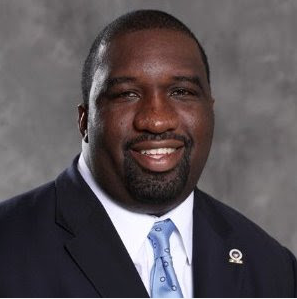
The following article is from The Chronicle’s of Social Change by Elizabeth Green published on July 26, 2016 and can be found here.
Last night, Jelani Freeman boarded a train from Washington, D.C. to Philadelphia, where today he will take the stage at the Democratic National Convention. Now working as an attorney in D.C., Freeman will speak from personal experience about how presidential candidate Hillary Clinton has made advocating for young people in foster care part of her “Lifetime of Fighting for Children and Families,” the Convention’s theme for today.
Freeman, who was in foster care from age eight to 18, plans to use his time in the national spotlight to make sure foster youth know what he has come to learn personally about Clinton.
“I’ll show them that they have a fighter in Hillary Clinton,” Freeman said, in an interview with The Chronicle of Social Change.
In 2003, Freeman was selected to be part of the inaugural class of the Foster Youth Internship Program, which places former foster youth in Senate or House offices. Freeman interned for Clinton during her tenure as the junior senator from New York.
The program is run through the Congressional Coalition on Adoption Institute (CCAI), a bi-partisan nonprofit organization born out of the Congressional Coalition on Adoption, which provides resources for Congress and staff on both sides of the aisle to engage with issues related to foster care and adoption.
The internship program invites a highly selective group of young people who have spent time in foster care to research policy, work with legislators, and create a policy report to share with child welfare advocates and present at a congressional briefing. Many continue work on Capitol Hill, or find other leadership roles in the advocacy field, after their internship is over.
“They go on to be quite extraordinary young leaders in their profession, whatever path they choose,” said Becky Weichhand, CCAI’s executive director.
Before Freeman heard about the program from another organization, the thought of working on Capitol Hill or doing an internship had never crossed his mind. Most internships do not pay to cover any costs of living for participants, he explained, which make them nearly impossible for young people in the system. However, this experience was geared specifically toward youth coming out of foster care and accounted for costs.
Since he was from New York, Clinton’s office requested that he be their intern. During his time there, Freeman got to interact with the Senator quite a bit. When he first met her after only a couple of days in the office, she already knew who he was. He distinctly remembers being invited to sit in with her on a meeting about a white paper from the Pew Commission on Children in Foster Care, about which she solicited his thoughts.
“She’s always been really encouraging, really supportive,” Freeman said.
Freeman became a McNair Fellow after his internship was over, extending his time in Clinton’s office. “She made me realize how important it was to give back,” he said. It was during his time in her office that he embraced his ability to advocate and tell his story on behalf of others in foster care.
Eventually, he went back to law school and he now works as an attorney, focused on issues facing veterans. He also serves as a Court Appointed Special Advocate, a volunteer position in which he helps support children in foster care.
After the convention, he will head with CCAI to Haiti to study the country’s child welfare system. Freeman recently passed the test to become a foreign services officer, and he sits on CCAI’s advisory council.
“He’s a quiet, humble leader,” Weichhand said. “So not only the staff here at CCAI, but the interns every summer that come to Capitol Hill, just have a tremendous amount of respect for him.”
He plans to use the national stage on Tuesday to highlight his experiences with Clinton as a mentor, and also to show foster youth that someone like them can find their way onto a national stage.
“You can’t be what you can’t see,” he said.
For adult viewers, Freeman said he hopes to inspire action.
“If they get any thing from my message it’s that there may be some young person in their town or city that is in need,” he said. “Hopefully … many more people will start to do the research about how they can get out there and help a young person.”